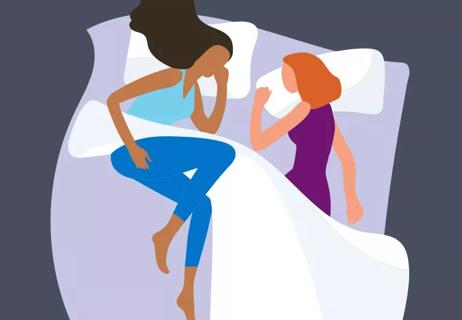There's no one way to express sexuality.

Historically, our culture has been filled with negative references about sex and sexual identity.
Advertisement
Cleveland Clinic is a non-profit academic medical center. Advertising on our site helps support our mission. We do not endorse non-Cleveland Clinic products or services. Policy
But the idea of being “sex positive” — an attitude about sexuality that is free from judgments — has gained new momentum over the last few years.
Psychologist Adriane Bennett, PhD, explains how sex positivity encourages respect, openness and acceptance.
You are sex positive if you emphasize openness, nonjudgmental attitudes, as well as freedom and liberation about both sexuality and sexual expression.
“It’s more of an attitude and acceptance of trying not to be judgmental either to yourself or other people who may have a different lifestyle,” says Dr. Bennett. “As long as they are consenting adults, you don’t see it as problematic behavior.”
You do not need to have sex — or be sexually active — to be sex positive. Being sex positive is about accepting yourself and all the different identities that are out there.
“It’s more about us as a person and our emotional development,” says Dr. Bennett. “Our relationships, how we bond with other people and how we express love with other people.”
As the opposite of sex positivity, many of us have dealt with sex negativity — attitudes that attach shame and judgment to others’ experiences and feelings about sexuality — whether it comes from other people, society or education.
Advertisement
“Much of it stems from religion or sex education that only emphasizes sex as being just about physical reproduction,” says Dr. Bennett. “Our brain is our biggest sex organ, so it’s going to include our emotions, our identity and our relationships.”
Examples of sex negative messages and behavior:
Having a more sex-positive culture and society can reduce the shame people feel, help prevent depression and even suicide, says Dr. Bennett. Here are a few ways you can be more sex positive:
Many of us grew up with negative messages regarding sex. “It may take some time, either through exposure to other cultures or even just exploring within yourself to realize that you are comfortable with different aspects of sex,” says Dr. Bennett.
For example, if someone is making a homophobic joke at work, speak up. “Don’t tolerate negative things,” says Dr. Bennett. “You can say, ‘I don’t really want to hear that.’” If you feel comfortable, you can have a conversation with the person about why they feel the need to engage in sex negativity. “They may come from a culture where they have some beliefs tied to sin, morality and shame,” says Dr. Bennett.
Being in touch with yourself and being open-minded will help you connect with others. “Maybe a friend who enjoys sex, but finds it shameful, is afraid to find a partner who will match their needs,” says Dr. Bennett. “Letting them know it’s OK to talk to you helps to remove stigmas.”
Advertisement

Sign up for our Health Essentials emails for expert guidance on nutrition, fitness, sleep, skin care and more.
Learn more about our editorial process.
Advertisement

Arousal without orgasm can be uncomfortable, but it’s no reason to pressure sexual interactions

Some foods are thought to rev up your sex drive, despite lack of scientific evidence

If anxiety is keeping you from having the sex life you want, communication, education and therapy can help

Anorgasmia is a fairly common concern with a wide range of physical and psychological causes

Your sexual history directly influences your physical, mental and emotional health in a multitude of ways

‘Safer sex’ means STI prevention, avoiding unintended pregnancies and psychologically safe practices for everyone

Medications and therapy can help get your groove back

It’s perfectly normal for gas pockets to ‘evacuate’ during the motions of sex

Even small moments of time outdoors can help reduce stress, boost mood and restore a sense of calm

A correct prescription helps your eyes see clearly — but as natural changes occur, you may need stronger or different eyeglasses

Both are medical emergencies, but they are very distinct events with different causes